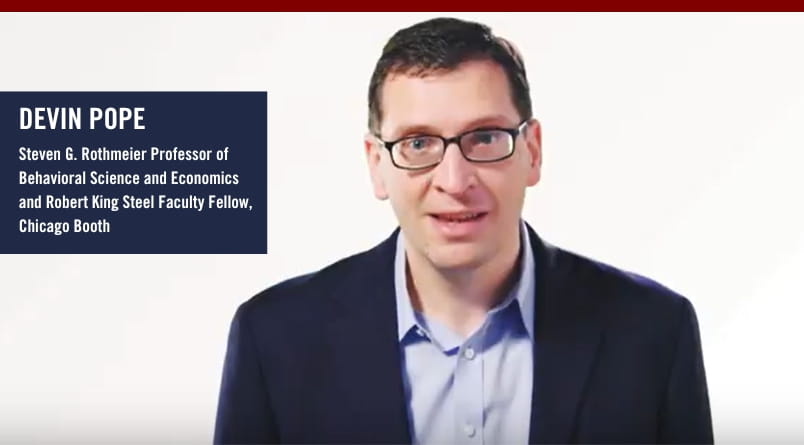
Devin G. Pope
Steven G. Rothmeier Professor of Behavioral Science and Economics and Robert King Steel Faculty Fellow
Devin G. Pope
Next Session
February 17-April 13, 2026
View All Dates
Location/Format
Online
Investment Fee (in USD)
$3,200 USD
Questions? Connect with our enrollment advisors.
Next Session
February 17-April 13, 2026
View All Dates
Location/Format
Online
Investment Fee (in USD)
$3,200 USD
Questions? Connect with our enrollment advisors.
Organizations around the globe are increasingly using insights from the field of behavioral economics to help people make more efficient decisions.
Discover how to apply cutting-edge behavioral economics principles from the University of Chicago Booth School of Business—home to Nobel laureates winning-research in behavioral economics—to create customer-centric strategies, design better products and services, and communicate value with impact.

Format
Online with live-online sessions
Program duration
Eight weeks, 3–5 hours per week
A High-Impact Learning Format
This program includes six live-online sessions in addition to self-paced learning modules. You’ll experience a blend of classroom sessions, group discussions, case studies, and other interactive coursework. Each module builds on the last, ensuring an impactful learning experience and giving you the confidence to make informed decisions that create measurable impact.
Mid- to senior-level executives from around the globe who are responsible for making impactful, efficient, and economic decisions for their organizations, as well as those who present choices to clients, customers, and key stakeholders.
Download the program brochure for in-depth insights into who should attend, participant profiles, and the ideal candidate.
Download brochure
At Booth, our distinguished faculty exemplify dedication and expertise, bringing deep passion to their teaching. Their steadfast commitment extends beyond traditional instruction, focusing on empowering every Executive Education participant, across all programs and global campuses, to achieve their professional and leadership goals.
“I entered the program with high expectations because of the University of Chicago's reputation in Business and Economics education. My expectations were exceeded because of the quality of the program. I was particularly impressed with the video presentations by Professor Pope, where the research was explained in relatable and understandable ways. The program encompassed the perfect ratios of charm, humor, and earnestness and inspired me to dig deeper into the material of behavioral economics.”
—Richard Korneck
“The program truly exceeded my expectations! It was very enlightening to better understand why people make their decisions and how those decisions can be influenced. The variety of content in each module was very engaging, and it was a bonus to have such a diverse group of peers from around the globe. The live sessions with Professor Pope, our guest speaker, Scott Young, and our mentors, Stuart and Jessica, were extremely worthwhile. I look forward to applying what I've learned both professionally and in my personal life.”
—Renee Neubecker, Director of Strategy, Motorola Solutions, Inc.
Program dates are subject to change.
Download the program brochure for in-depth insights on who should attend, a schedule preview, past participant profiles, location highlights, networking opportunities, and what to expect. When doing so, you’ll also receive an editable justification letter to help you make the case to your employer for your attendance.
All fields required.
Inform your peers and coworkers about this program.